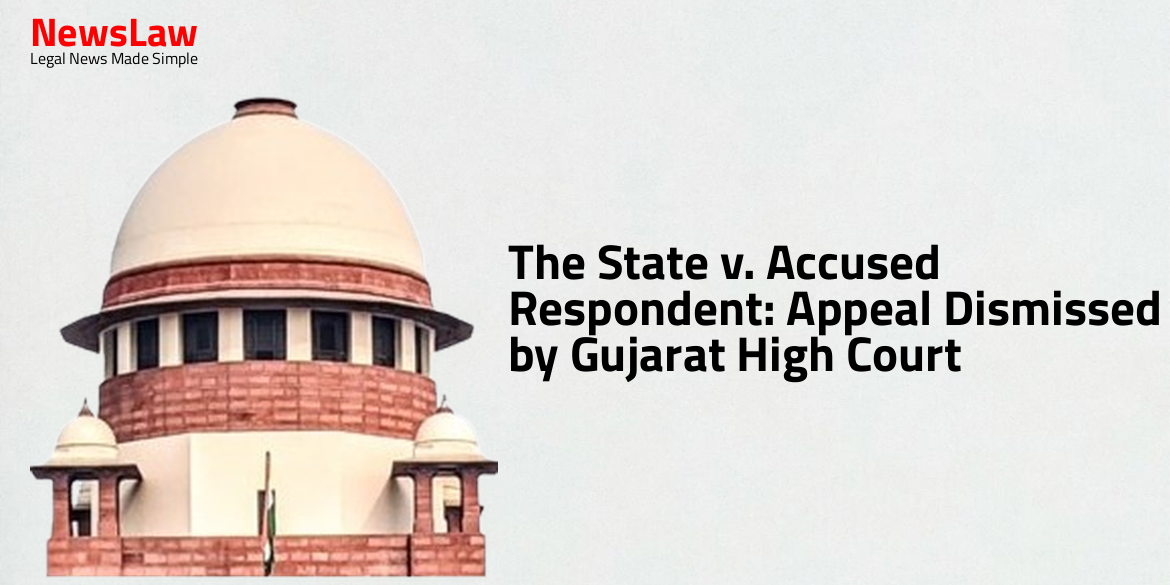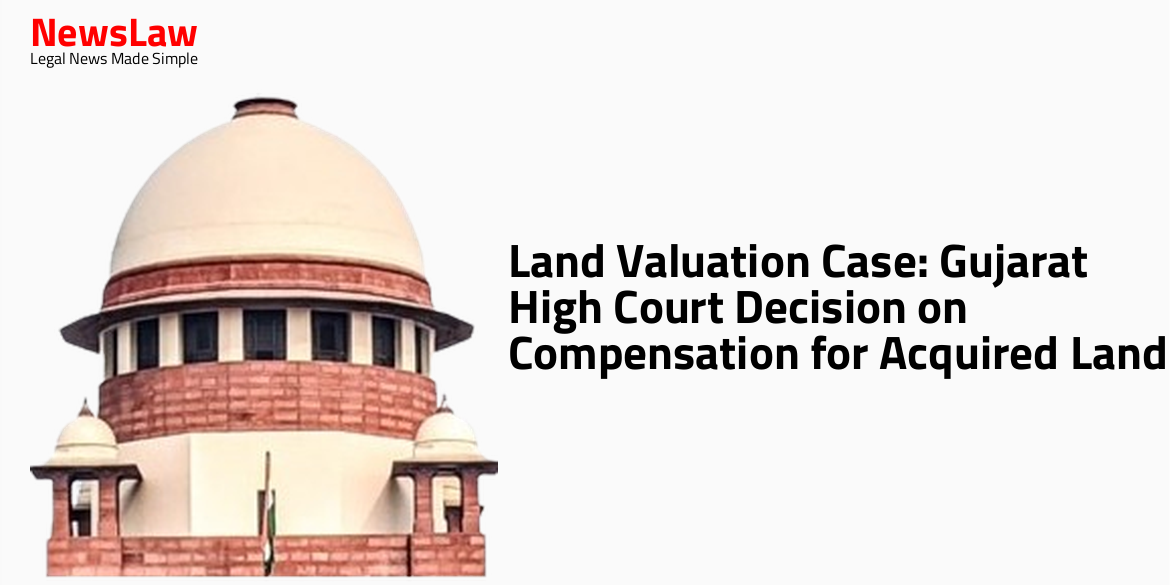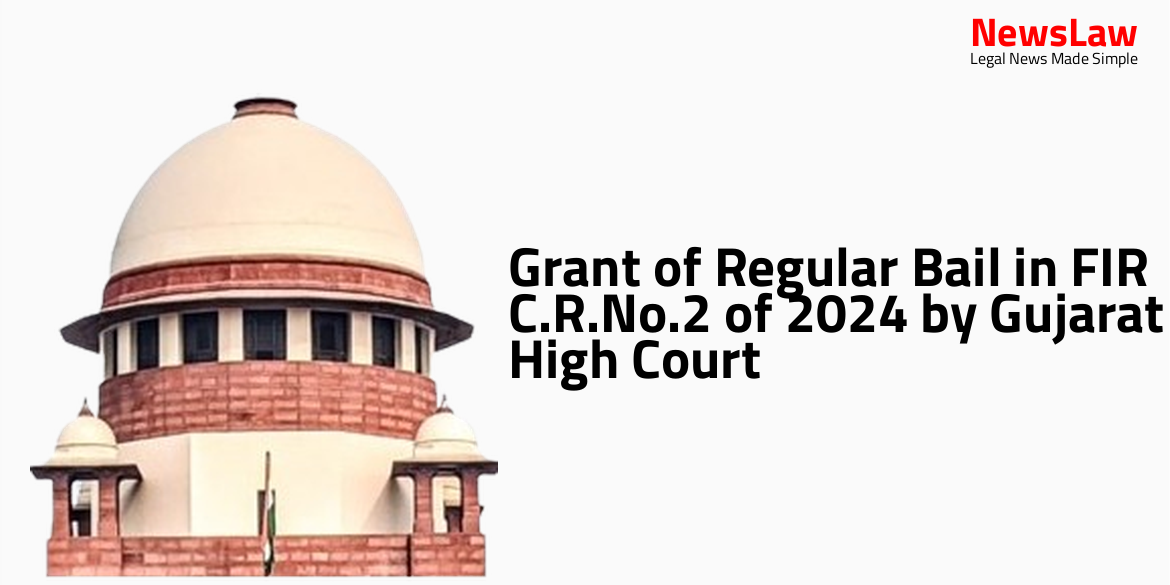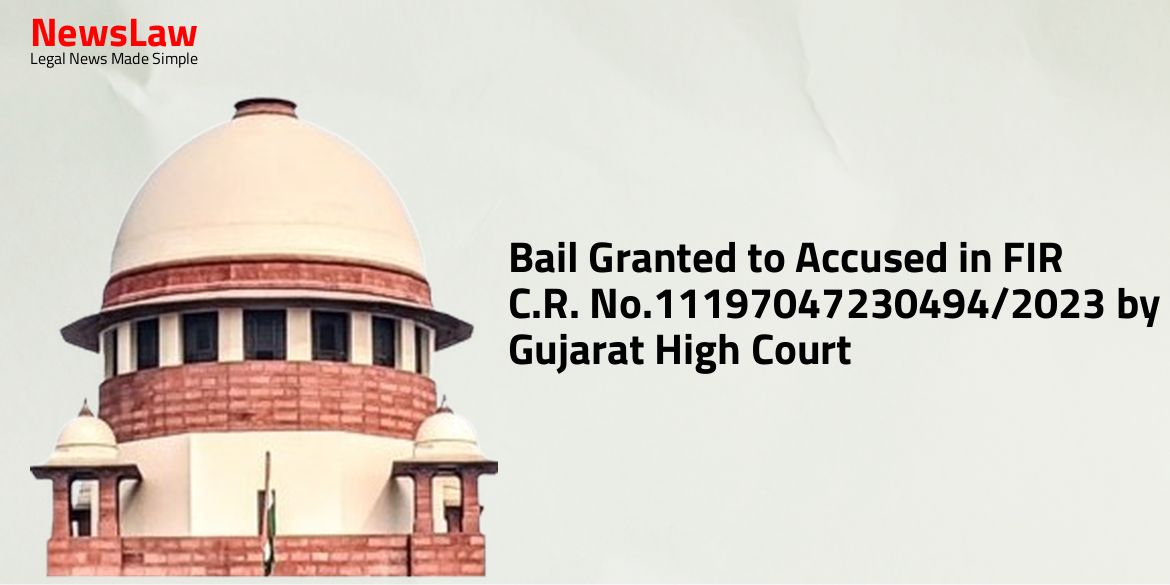In a recent judgment by the Gujarat High Court, concerning The State v. Accused Respondent case, the Court addressed the appeal filed by the appellant-State against the judgment of acquittal. The case involved allegations of murder and destruction of evidence against the accused respondents. The Court explored the evidentiary aspects and the principle of benefit of doubt in criminal proceedings. Let’s delve into the details of this significant legal development.
Facts
- The appellant-State has filed this appeal against the judgment and order of acquittal passed by the learned Sessions Judge
- The respondents were acquitted for the offences under section 302 read with section 34 and 201 of the Indian Penal Code
- The Sessions Judge acquitted the accused by giving them the benefit of doubt
- The appellant-State is aggrieved and dissatisfied with the acquittal order and has filed this appeal
- Accused no. 2 Dilipbhai was also woken up and carried out with an iron rod and battery towards the well where the screams of Hirabhai were heard.
- Witness Kanubhai and Rayjibhai found Mangalbhai carrying an axe and accused no. 2 Dilip stated that the deceased Hirabhai fell into the well.
- On the night of the incident, accused no. 2 Dilip, Arvindbhai, and Kanubhai were playing cards while accused no. 3 Rayjibhai was sleeping.
- Deceased Hirabhai and accused no. 1 Mangalbhai started abusing each other after consuming liquor, leading to an altercation where Mangalbhai followed Hirabhai with an axe.
- Accused no. 1 Mangalbhai and one Ramanbhai discouraged lodging a complaint about Hirabhai’s death to prevent the body from getting spoiled.
- Investigation revealed that the accused no. 2 and 3 had given false information about an accident, and it was found that they had administered poison to the victim and made it appear as an accident.
- Accused no. 1 Mangalbhai was found carrying an axe with blood stains, and it was discovered that the victim, Hirabhai, had died due to injuries sustained during the altercation.
- Accused no. 1 and 3 threatened others not to disclose the true nature of the incident under threat of being killed.
- The trial court presented various incriminating circumstances to the accused during the trial to elicit explanations as per section 313 of the Code.
Arguments
- The learned APP argued that the accused respondent played a significant role in destroying evidence and providing false information to the first informant.
- The APP pointed out that the accused respondent was present at the time of the incident and assisted the other accused in concealing evidence.
- The APP contended that charges against the accused respondent under sections 34 and 201 of the IPC could be proven based on the material on record.
Analysis
- The only surviving accused, Rayjibhai, was present at the scene and allegedly tried to destroy evidence by portraying the deceased’s murder as an accident.
- The learned Sessions Judge did not believe it was a case of murder and granted the benefit of doubt to the accused.
- The charge against the accused was that they tried to prevent being tried for an offence by falsely presenting the death as an accident.
- The prosecution failed to establish beyond reasonable doubt that the deceased was murdered by the accused Mangalbhai.
- No credible material was found against the deceased accused no. 1 and 2 who have already expired, therefore no basis for interference with the judgement of acquittal.
- No allegations were raised against the accused respondent no. 3 regarding assaulting the deceased or carrying weapons.
- In a case of acquittal appeal, unless the trial court’s findings are evidently wrong or unsustainable, a different view cannot be imposed by the appellate court.
- The acquittal cannot be upset unless reasoning by the learned trial Court is found to be perverse.
- High Court’s interference in such appeal is circumscribed and should not interfere if the view taken by the trial Court is possible on the evidence.
- The powers of the High Court in an appeal from order of acquittal are as extensive as in any appeal against the order of conviction.
- High Court should give proper weight and consideration to the view of the Trial Court with regard to credibility of witnesses, presumption of innocence, right of the accused to benefit of doubt, and the slowness of appellate Court in justifying a finding of fact.
- If the main grounds on which the lower Court has based its order acquitting the accused are reasonable and plausible, the High Court should not disturb the order of acquittal.
- Considering the facts and circumstances of the case and the law laid down by the Hon’ble Supreme Court
- Scope of appeal under Section 378 of the Code of Criminal Procedure was considered
- No case found to interfere with the impugned judgment and order of acquittal
Decision
- Registry directed to return record and proceedings to concerned Court.
- Present Criminal Appeal dismissed.
Case Title: STATE OF GUJARAT Vs. MANGALBHAI JETHABHAI PATEL
Case Number: R/CR.A/796/1999



